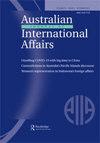印尼担任G20轮值主席国:新自由主义政策与威权主义倾向
IF 1.8
3区 社会学
Q2 INTERNATIONAL RELATIONS
引用次数: 5
摘要
摘要:区域和全球舞台上的多边主义对印尼的外交政策至关重要。东盟长期以来一直是印尼地区经济相互依存和政治稳定的关键组成部分,除此之外,20国集团最近也增加了该国的兴趣。它符合印尼对全球领导地位和中等强国地位的渴望。随着印度尼西亚于2022年开始担任为期一年的二十国集团主席国,政府相信,2022年底举办的多次会议和二十国集团峰会是其国际领导力曝光的一个显著里程碑。这一次,印尼总统佐科·维多多强调了优先议程:加强全球卫生架构,向绿色和可再生能源过渡,以及促进数字经济。这篇评论评估并预测了印尼在近年来民主衰落的情况下担任二十国集团主席国的情况。它认为,印尼提出的议程与其说是战略性的,不如说是雄心勃勃的目标。相反,该国的优先事项将是稳固的新自由主义经济政策和稳定,这可能会在国内造成更大的民主挫折。本文章由计算机程序翻译,如有差异,请以英文原文为准。
Indonesia’s G20 presidency: neoliberal policy and authoritarian tendencies
ABSTRACT Multilateralism at the regional and global stage is essential for Indonesia’s foreign policy. Apart from ASEAN, which has long been a pivotal array for Indonesia’s regional economic interdependence and political stability, the G20 is recently added to the country’s interest. It serves Indonesia’s desire for global leadership and middle-power status. As Indonesia began its year-long presidency of the G20 in 2022, the government is confident that hosting numerous meetings and the Group’s summit at the end of 2022 is a notable milestone for its international leadership exposure. This time, Indonesia’s President Joko Widodo emphasises priority agendas: strengthening global health architecture, transitioning to green and renewable energy, and promoting the digital economy. This commentary evaluates and projects Indonesia’s G20 presidency amidst the country’s democratic decline in recent years. It argues that Indonesia’s proposed agendas are more ambitious goals than strategic. Instead, the country’s priority will be marked by a solid neoliberal economic policy and stability, which is likely to cause even more democratic setbacks at home.
求助全文
通过发布文献求助,成功后即可免费获取论文全文。
去求助
来源期刊

Australian Journal of International Affairs
INTERNATIONAL RELATIONS-
CiteScore
3.20
自引率
13.30%
发文量
44
期刊介绍:
AJIA is the journal of the Australian Institute of International Affairs. The Institute was established in 1933 as an independent and non-political body and its purpose is to stimulate interest in and understanding of international affairs among its members and the general public. The aim of the Australian Journal of International Affairs is to publish high quality scholarly research on international political, social, economic and legal issues, especially (but not exclusively) within the Asia-Pacific region. The journal publishes research articles, refereed review essays and commentary and provocation pieces. ''Articles'' are traditional scholarly articles. ‘Review essays’ use newly published books as the basis to thematically examine current events in International Relations. The journal also publishes commentaries and provocations which are high quality and engaging pieces of commentary, opinion and provocation in a variety of styles. The Australian Journal of International Affairs aims to analyse international issues for an Australian readership and to present Australian perspectives to readers in other countries. While seeking to stimulate interest in and understanding of international affairs, the journal does not seek to promote any particular policies or approaches. All suitable manuscripts submitted are sent to two referees in a full ''double blind'' refereeing process.
 求助内容:
求助内容: 应助结果提醒方式:
应助结果提醒方式:


